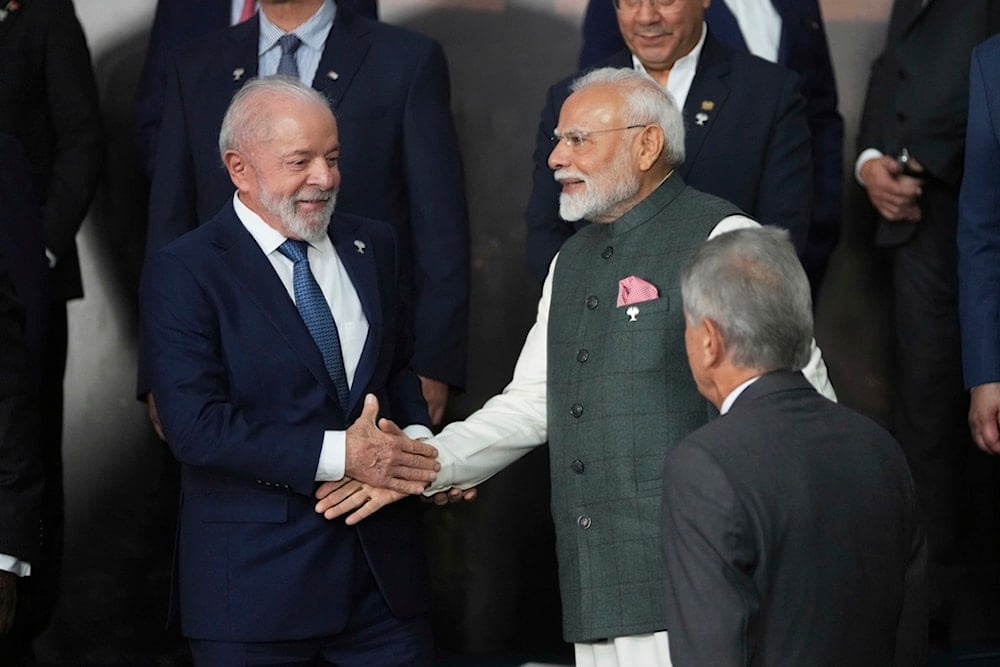Tariffs as political weapons face pushback from India, Brazil: NYT
An op-ed by Matias Spektor in the New York Times argues that Trump's 50% tariffs on India and Brazil are coercive tools of foreign policy, but both nations are resisting through strategic hedging to preserve autonomy in an increasingly fragmented global order.
-

Brazilian President Luiz Inacio Lula da Silva, left, greets India's Prime Minister Narendra Modi prior to a group photo during the 17th annual BRICS summit in Rio de Janeiro, Monday, July 7, 2025. (AP Photo/Silvia Izquierdo)
An op-ed published by writer Matias Spektor for the New York Times on Tuesday argues that President Trump's decision to impose 50% tariffs on India and Brazil amounts to more than a trade dispute; it is a political maneuver designed to reshape the domestic and foreign policies of two of the Global South's largest economies.
According to Spektor, the White House is pressuring India to abandon its ties with Russia and demanding that Brazil's government drop charges against former President Jair Bolsonaro, who stands accused of attempting a coup after losing the 2022 election. By tying economic penalties to political compliance, Trump is turning tariffs into "tools of political coercion."
Unlike US allies in Europe, South Korea, and Japan, which have often bowed to Washington's trade demands, India and Brazil are resisting. Rather than surrendering to American pressure, both governments are doubling down on alternative strategies. Their approach, Spektor notes, reflects a doctrine political scientists call strategic hedging, building diverse partnerships to ensure no single power can dictate terms. "Think of it as a geopolitical version of portfolio strategy," the piece explains: just as investors diversify assets, nations diversify relationships.
Hedging against hegemony
Spektor situates this strategy in a long history of skepticism toward American dominance. Since the 1990s, India and Brazil have sought to reduce dependence on Washington, observing how the United States often exempted itself from global rules and used its power selectively. That mistrust, he suggests, has prepared them to weather Trump's latest tariffs.
In response to the new measures, Brazilian exporters are cultivating markets in Africa, Europe, the Middle East, and Southeast Asia, while Indian firms are accelerating global certifications and trade agreements outside of Washington's orbit. These moves, the op-ed stresses, are not perfect substitutes for access to the US market, but they give both nations room to resist.
China, however, does not offer a simple alternative. Beijing's own dependencies, preferential trade terms, and regional tensions limit its role as a substitute for US power. For now, BRICS provides a forum for coordination, but lacks the governance structures to anchor true economic independence.
Managed Disorder
Spektor acknowledges that strategic hedging carries risks. Brazil and India both struggle with entrenched problems such as inequality, corruption, and weak governance, which reduce their leverage in global markets. At the same time, global finance, technology, and security systems remain heavily tied to US-led networks, limiting how far emerging economies can detach. Markets may also interpret hedging as instability, triggering higher borrowing costs and currency volatility.
Still, "even imperfect hedging beats capitulation," Spektor writes. India and Brazil's example may encourage other nations, from South Africa and Indonesia to Turkey and the Philippines, to preserve their own autonomy by avoiding the binary choice between Washington and Beijing. If successful, this strategy could accelerate the fragmentation of the global system into what Spektor calls "managed disorder": a world of competing powers and weak institutions, reminiscent of early 20th-century multipolarity.
Read more: FA: America's economic weapons are now being used against It
The op-ed warns that Trump's tariffs will not restore American primacy but instead "speed up its decline." Each punitive action, it argues, only convinces more countries that dependence on Washington is dangerous, and more will seek alternatives, even if they are inefficient, because autonomy is worth more than economic efficiency when trust is absent.
The piece concludes that the dissolution of US dominance may not be inevitable, but without a shift from coercion to patient diplomacy, Washington risks undermining its own global influence.

 4 Min Read
4 Min Read








